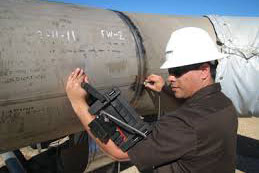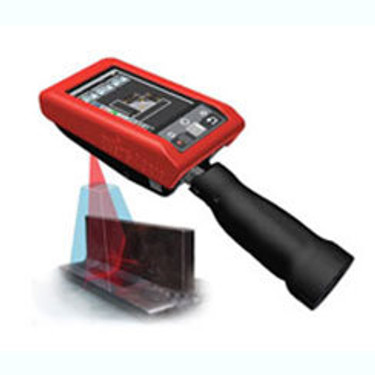The Influence of Strenuous Welding Examination on Industry Criteria: Promoting Safety, Reliability, and Compliance Across Various Sectors
The duty of extensive welding assessment is significantly recognized as a vital component in boosting market requirements, where reliability, conformity, and security take precedence throughout diverse fields. What improvements might we prepare for in welding methods as the demand for top quality and safety escalates?
Relevance of Welding Assessments
Acknowledging the important duty of welding assessments in keeping top quality and security criteria, market professionals prioritize these evaluations to make certain structural integrity. Welding examinations function as an essential checkpoint in the manufacture process, determining defects that can jeopardize the sturdiness and safety of welded frameworks. By systematically examining welds, inspectors can find issues such as incomplete penetration, porosity, and splits, which may not show up to the naked eye.
The significance of these assessments expands past mere conformity; they are necessary for protecting lives and shielding investments. In vital sectors such as aerospace, manufacturing, and building, a single malfunctioning weld can lead to disastrous failings, causing both economic loss and human casualties. Consequently, carrying out extensive examination methods mitigates these threats and boosts total task integrity.
Moreover, regular welding assessments cultivate a culture of top quality across organizations, encouraging welders to stick to finest practices and preserve high requirements in their job. This commitment to high quality not only improves operational effectiveness yet additionally reinforces the reputation of firms within their particular industries. Hence, welding examinations are crucial in advertising safety, integrity, and conformity throughout numerous sectors.
Key Market Criteria and Rules
The framework of welding assessments is underpinned by a robust collection of market requirements and regulations that govern techniques across different sectors. Secret institutions, such as the American Welding Society (AWS) and the International Organization for Standardization (ISO), develop guidelines that guarantee top quality and safety and security in welding operations. As an example, AWS D1.1 details vital needs for welding steel structures, while ISO 3834 specifies top quality requirements for blend welding.
In enhancement to these particular criteria, industry guidelines like the American National Criteria Institute (ANSI) and Occupational Safety And Security and Health Administration (OSHA) mandates better boost conformity by establishing security methods and functional best practices. These regulations are vital in markets such as aerospace, production, and building, where welding stability is extremely important.
Moreover, sector-specific criteria, such as those from the American Society of Mechanical Engineers (ASME) for stress vessels, provide extra layers of scrutiny to make sure that welds meet rigorous safety and performance requirements. Adherence to these standards not just facilitates regulatory conformity however likewise fosters a society of high quality and reliability throughout the welding market, ultimately guarding public welfare and enhancing functional effectiveness.

Advantages of Conformity and Integrity
Regularly adhering to industry criteria and laws in welding inspections returns significant advantages, enhancing overall reliability and efficiency. The primary advantage is the assurance of quality in welded joints, which directly contributes to the safety and security of structures and devices. Compliance with recognized criteria lessens the risk of failing and catastrophic events, therefore securing both human life and beneficial possessions.
Additionally, organizations that focus on strenuous welding assessments foster a culture of liability and professionalism and trust. This commitment not just strengthens the online reputation of the firm however likewise imparts self-confidence in clients and stakeholders concerning the stability of product or services. Trusted welding processes result in lowered costs connected with rework, repairs, and prospective lawful responsibilities stemming from below average workmanship.
Furthermore, maintaining conformity with sector criteria helps with smoother regulative communications, as companies can easily show adherence to needed methods (Welding Inspection Gilbert Arizona). This aggressive strategy can lead to useful collaborations and possibilities within the market, along with accessibility to brand-new markets
Difficulties in Welding Examination
Navigating the intricacies of welding assessment presents a myriad of obstacles that can impede conformity with sector standards. The absence of standardized training for inspectors can result in diverse analyses of evaluation criteria, which might jeopardize security and integrity.
An additional difficulty hinges on the accessibility of sophisticated examination tools - Welding Inspection Gilbert Arizona. While innovations such as ultrasonic testing and radiography can enhance discovery capabilities, their application might be limited by expense or schedule, particularly in smaller sized procedures. This variation can bring about a dependence on less effective examination approaches, raising the threat of undetected problems
Furthermore, the busy nature of modern manufacturing often pressures examiners to focus on rate over thoroughness, possibly overlooking vital issues. Regulatory compliance can be daunting due to the progressing nature of sector standards, leaving organizations struggling to right here keep up with the most recent demands. These difficulties necessitate continual improvement in assessment practices to make certain the stability of welded frameworks across numerous markets.
Future Trends in Welding Practices
Arising modern technologies and evolving methods are readied to transform welding practices in the coming years. Advancements in automation, such as robot welding systems, are gaining traction, boosting accuracy and performance while decreasing human mistake. These systems will certainly not only speed up manufacturing however likewise facilitate regular quality control, dealing with a few of the obstacles dealt with in hand-operated welding.
Furthermore, the integration of synthetic intelligence (AI) and device knowing right into welding procedures is poised to reinvent evaluation and surveillance. Real-time information analytics will make it possible for predictive upkeep, permitting proactive treatments that decrease downtime and rise safety and security. Increased truth (AR) and online truth (VR) technologies are becoming instrumental in training welders, providing immersive experiences that boost skill development without the risks connected with conventional methods.
Sustainability is also a crucial trend, as industries seek greener practices. The fostering of environment-friendly products and approaches, along with energy-efficient equipment, will likely become typical. As sectors adjust to these changes, the focus will move toward higher conformity with safety and security and environmental guidelines, making sure that welding techniques not only meet present requirements but also lead the way for a safer and more sustainable future.

Final Thought
In conclusion, rigorous welding evaluations substantially boost sector standards by guaranteeing security, reliability, and conformity throughout numerous Source markets. As markets proceed to prioritize his explanation operational integrity, the value of thorough evaluations will only increase, inevitably profiting companies and society at big.
The duty of extensive welding inspection is significantly acknowledged as a vital part in enhancing market standards, where compliance, dependability, and safety take priority throughout diverse sectors. Therefore, welding evaluations are important in promoting safety and security, integrity, and conformity throughout numerous sectors.
Key establishments, such as the American Welding Culture (AWS) and the International Company for Standardization (ISO), develop guidelines that make sure quality and security in welding procedures. AWS D1.1 lays out vital needs for welding steel frameworks, while ISO 3834 specifies quality demands for blend welding.
In verdict, extensive welding inspections considerably improve sector criteria by ensuring safety, dependability, and compliance across different markets.